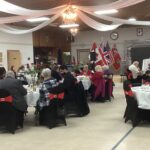
Homeless camp in Cornwall, On.
A newish resident of the city of Cornwall, Phyllis Sarault, was on a bus downtown when she noticed a young woman sitting in a little tent next to city hall. It bothered her all night. The next day she returned to the tent with things she thought the young woman might need. The young woman explained that she was camped in the tent to raise awareness about homelessness but that she herself would be moving that day.
Rather than walk away feeling like “job done”, Phyllis got mad. The best kind of mad. Mad that gets things done. She got on the phone and computer and organized a rally against homelessness that took place on Tuesday, August 1, 2023. Her initiative caught the attention of Tina Point who runs the Unity Street Help Association – a mostly volunteer group that works closely with the homeless. Tina facilitated a visit to a local homeless camp for Phyllis and me.
Initially, the place is woodsy and almost idyllic. As you walk in, the area is clean and litter-free and attempts have been made to ensure that the path is safe for walkers – mostly through the efforts of Pete Hassell and others living there.
To me, Pete feels kind of like the “dad” of the area. He is homeless himself but is a capable and empathetic individual who works alongside Tina Point to ensure the group’s safety and to welcome and orient newcomers who need a place to stay.
We talked in very general terms about the camp, the people who used it and Pete’s own story.
He acknowledged the vital help they get from Tina and her volunteers, from Agape and from Centre 105 and others. But he was worried and agitated about the harassment and ill-treatment they receive regularly.
Nobody wants to be homeless but if you are, you have to stay somewhere. You are alive; you occupy space. Rather than sleeping on a park bench or in a doorway, this group has quietly organized themselves in a camp. But they are not left alone – there are those bent on tormenting them. During the daytime, individuals gather nearby, across a small creek, and trash talk them. At night, darkness engulfs the area that was once lit by park lights, providing cover for “kids” to creep into the compound and harass the tent dwellers. They unzip tents to startle the occupants and pelt the tents with bb guns or stones intent on causing mischief and fear.
This keeps him up at night – literally. Other issues worry him as well. A plug near their encampment allowed those who had phones to charge them. Now the power has been cut. The porta potty near the site is used by all visitors to the area including the homeless. The thing has not been emptied in weeks. It houses a veritable mountain of sh*t. Shut-off lights, a filthy toilet and a power cut feel like they could be punitive actions against people who already struggle greatly.
Despite this, there are many organizations and people who are working on their behalf. Up close and personal is the aforementioned Unity Street Help Association founded by Tina Point and her son Tyrese Mwampokolo Point about 4 years ago. A Mohawk from Akwasasne, Tina was brought up with close earthly and spiritual ties to her elders. She has always felt guided to help others. With a small army of volunteers, Tina works to ensure as best they can that our local homeless are taken care of. They check in regularly and distribute food and goods that they collect from donors. I was impressed with Tina’s humanity and compassion. A heart-led advocate, she is also available to lend an ear to someone in need.
Stephen Douris is deeply invested in helping the homeless because he’s been there himself. At 40, Stephen was a “can-do” guy who could not turn down any opportunity or challenge. The death of his dear mother, marital problems and exhaustion led Stephen to burnout and mental illness. Unable to work consistently, Stephen lost his businesses and filed for bankruptcy. He subsequently spent months living in an old station wagon. Compared to many homeless he was lucky. He had people who cared about him and helped him along the way. A friend gave him odd jobs. He had places he could go to clean up and eat. But at the same time, his mental struggles kept him apart from his loved ones. He credits much of his present-day happiness to his wife Mary’s unwavering support, to certain friends and to an excellent therapist.
Curtis Jordan was raised in Ottawa by a single parent. His mother’s chronic poor health and no family support guaranteed a life on the edge. Living in ratholes, they were frequent victims of rent hikes and renovictions as Ottawa speculators gentrified the city. Unable to pay movers, they were often forced to leave with what they could carry.
Frequent relocations, shelter stays and Curtis’ living with Autism made getting a good education impossible. Curtis grew up with a persistent fear of homelessness. Despite being on housing waitlists for years they were never offered a unit. Talk about slipping through the cracks!
Fortunately, Curtis is exceptionally bright, hard-working and industrious. He achieved stability by working multiple jobs, purchasing a modest condominium for his mother at age 24, then purchasing a farmhouse for himself at age 27. At 29, he was elected to the USDSB as trustee for Stormont-Glengarry.
Other stories are less satisfying. Many homeless struggle with learning difficulties, intellectual impairment, mental or physical illness, addictions and alcoholism as well as a simple lack of money to cover their needs. The stories above underscore just how fragile stability is.
Anybody can end up homeless in a variety of ways. It can be visible with no or limited shelter like sleeping in a doorway or tent. It can also be less visible like living in a car or couch surfing with friends who can easily kick you out. All of these are precarious ways to live.
Tina Point estimates around a hundred individuals are currently without shelter. Some estimates double that.
Camping is meant to be for sport and for fun. Otherwise, there is no good reason to let people live in tents. In the summer it seems not so bad on the surface, but imagine being out in some of the torrential rains we’ve had, or through tornado warnings or in the blistering heat. Imagine waking up at every sound; scared that you’ll get hurt or raped? Imagine being harassed by people who taunt you because they know you can’t fight back. Imagine that your camping trip is forced; without regular food, in an area that may not be “lovely”, without easy access to a washroom and shower? Now imagine all of that in a Canadian fall and winter.
We can eradicate homelessness; other cities have done it. But we must work intelligently as a community. In addition to having some kind of sheltering plan & place for our homeless for the upcoming winter, we must work harder to address the issues that cause homelessness in the first place.
Author’s note: If you want to help, here are some places that can use it:
The Unity Street Help Association here. Leave a message on their Facebook page here and they will contact you. They need: gas cards for volunteers, canned foods, perishables, camping supplies, containers, utensils, water bottles, weatherproof tents & sleeping bags, camp chairs, first aid kits etc. They also need volunteer drivers and people who can cook food.
Agape Centre here : They can always use food, money and articles for their thrift shop.
Centre 105 here: Food & money.
Baldwin House here: Money, clothing & toiletries for women & children. If not used by the women sheltering with them, clothing is sold through Serenity Boutique to raise funds.
The United Way here: Money mostly. You can also donate your old car to help them raise cash.
Additional reading: https://community.solutions/case-studies/medicine-hat-becomes-first-city-in-canada-to-end-chronic-homelessness/













